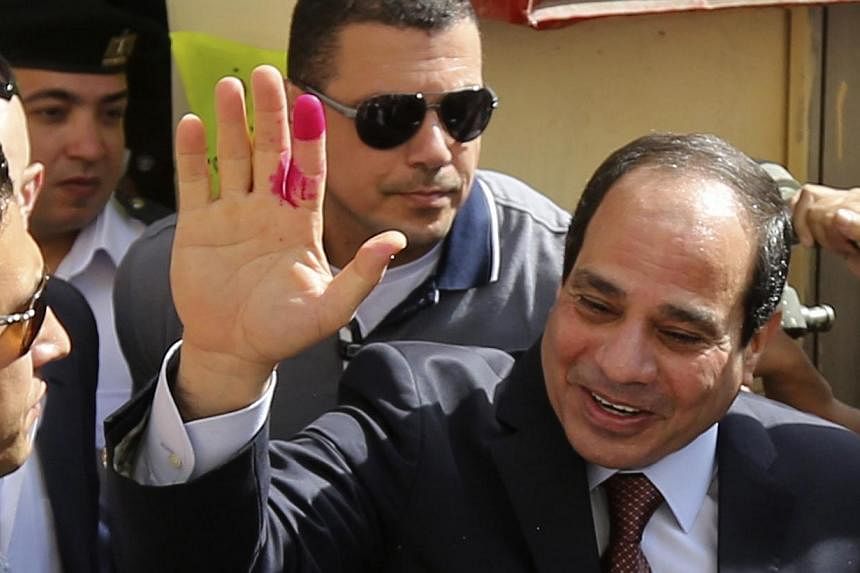CAIRO (AFP) - Egypt's new president Abdel Fattah al-Sisi, who was sworn in on Sunday, may have donned civilian clothes but his crackdown on opponents has raised fears the ex-army chief could herald a return to autocracy.
Mr Sisi was chosen as president in a May 26-28 election with 96.91 percent of the vote, nearly a year after toppling the country's first freely elected leader, Islamist Mohamed Morsi.
In a televised address following the results and a lower than anticipated turnout, Mr Sisi struck a positive note, saying: "The future is a blank page, and it is in our hands to fill with what we want ... bread, freedom, human dignity, social justice".
The 59-year-old became Egypt's most popular political figure and de facto head of state after leading the July 3 ouster of Morsi following massive rallies demanding the Islamist's resignation.
A subsequent crackdown on Morsi's supporters left at least 1,400 dead and thousands more in jail.
Since he retired from the army to run for office, Mr Sisi has preferred to address the people through television interviews, appearing in crisp suits and often smiling.
Mr Sisi has said that for him, "national security" takes precedence over democratic freedoms.
It could take "20 to 25 years to achieve true democracy," he told Egyptian newspaper editors in an interview, saying the Arab world's most populous nation cannot be compared to Western democracies.
Such remarks have sparked concern of a return to autocracy worse than under Hosni Mubarak, who was ousted by a popular uprising in early 2011.
Mr Sisi himself served as Mubarak's military intelligence chief, the youngest officer to hold the post.
Mubarak's successor Morsi promoted Sisi to defence minister in what was seen at the time as an assertion of civilian control over the military, which ruled between Mubarak's overthrow and Morsi's election in June 2012.
Since last July, more than 15,000 people have been jailed, with hundreds sentenced to death after cursory trials, triggering widespread international outrage.
The crackdown has also seen secular-leaning activists who revolted against Mubarak jailed for organising unlicensed protests.
- Nationalist icon -
Mr Sisi's actions against the Brotherhood have seen him emerge as a nationalist icon in the mould of Egypt's first modern military ruler, Gamal Abdel Nasser.
Sisi and Nasser, the charismatic colonel who deposed King Farouk in 1952 and ruled until his death in 1970, both rode to popularity overseeing crackdowns on the Islamist movement.
But unlike Nasser, a champion of pan-Arabism whose speeches brought people onto the streets, Sisi has kept a lower profile.
His supporters see him as a tough leader able to restore stability and kick-start an economic recovery after years of unrest.
Other Egyptians simply want him to end the turmoil that has dogged the country since 2011.
"I voted for Sisi for stability, but I fear a crackdown on freedoms," one 29-year-old voter told AFP after the election.
But his opponents in the Brotherhood despise him, comparing him to a pharaoh and to villains of Islamic lore.
"CC (Sisi's name in graffiti shorthand) is a killer" reads one slogan scrawled on Cairo walls by detractors.
However, these are dwarfed by the ubiquitous image of a uniformed Sisi plastered on walls, car windows and even on cakes in bakeries.
To his supporters, Mr Sisi is a pious, humble man of the people, who addresses them in colloquial rather than classical Arabic.
An aide told AFP that Mr Sisi prays five times a day in accordance with Islamic practice and his wife, like most Muslim women in Egypt, covers her hair with a headscarf. The couple have four children.
Mr Sisi often invokes religious sentiment in speeches, and during studies at the US Army War College in 2006, he wrote a thesis saying support from Islamic opinion makers was crucial for democratic governance in the Middle East.
This has won him the support of the Salafist Al-Nur party, a former Brotherhood ally.

